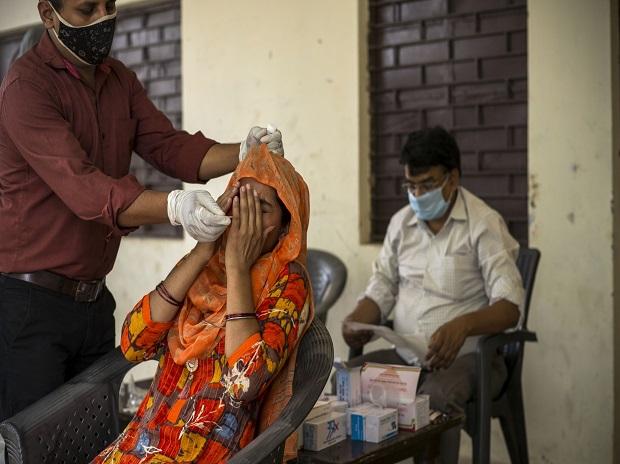India will need to spend an additional 800 billion rupees ($11 billion) to provide free vaccines and food to millions of people devastated by the deadly coronavirus wave, people with knowledge of the matter said.
The government will earmark an additional 700 billion rupees for providing food to the poor and other eligible groups until November, said the people, who asked not to be identified as the numbers aren’t public. The administration will need an extra 100 billion rupees to provide free vaccinations, they said.
Prime Minister Narendra Modi agreed Monday to provide free inoculations, reversing a policy where states ended up competing for supplies for certain age categories, leading to severe shortages. His administration also has been criticized for its handling of the second wave of the virus, which has killed thousands of people in India.
In an address on national television, Modi said all Indians above age 18 can be vaccinated for free starting June 21, to speed up the inoculation drive.
The government may not have to tap the bond market for the funds, the people familiar said, citing the 991.2 billion-rupee dividend the government received from the central bank and expected inflows from asset sales. With the extra money, the government will end up spending a total of 1.3 trillion on providing food, the people said, and has set aside 350 billion rupees for vaccinations in the budget.
A finance ministry spokesman declined to comment.
Even after accounting for the bumper dividend from the Reserve Bank of India and better growth numbers that should result in higher tax revenue, the “fiscal math will likely worsen,” said Madhavi Arora, an economist with Emkay Global Financial Services Ltd. in Mumbai. That’s because of higher payouts on food and fertilizer subsidies as well as for a rural jobs-guarantee program. There’s also a risk that the asset-divestment program could raise less money than anticipated.
“Amid various push and pull there is a likelihood of fiscal slippage, to the tune of around 0.5% from the initially budgeted 6.8% of gross domestic product,” she added, referring to the expected fiscal deficit.
India has administrated 232 million doses since the world’s biggest vaccination drive began Jan. 16, with 3.4% of the population now fully immunized. At that pace, it will take another 22 months to cover 75% of the population, according to the Bloomberg Vaccination Tracker.
 Dear Reader,
Dear Reader,
Business Standard has always strived hard to provide up-to-date information and commentary on developments that are of interest to you and have wider political and economic implications for the country and the world. Your encouragement and constant feedback on how to improve our offering have only made our resolve and commitment to these ideals stronger. Even during these difficult times arising out of Covid-19, we continue to remain committed to keeping you informed and updated with credible news, authoritative views and incisive commentary on topical issues of relevance.
We, however, have a request.
As we battle the economic impact of the pandemic, we need your support even more, so that we can continue to offer you more quality content. Our subscription model has seen an encouraging response from many of you, who have subscribed to our online content. More subscription to our online content can only help us achieve the goals of offering you even better and more relevant content. We believe in free, fair and credible journalism. Your support through more subscriptions can help us practise the journalism to which we are committed.
Support quality journalism and subscribe to Business Standard.
Digital Editor

RECOMMENDED FOR YOU